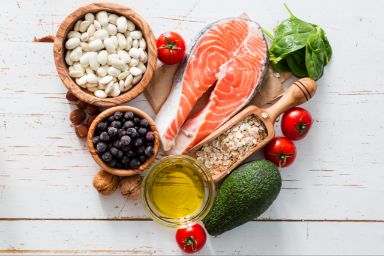
If you’re one of the millions of Americans who have been diagnosed with sleep apnea, you already know it impacts your life. But restless nights, low-energy days, and loud snoring aren’t even the worst of it. Obstructive sleep apnea in State College has been shown to increase the risk for many serious conditions like depression, weight gain, high blood pressure, and stroke. There are great treatment options available such as oral appliance therapy, but did you know your diet is also a factor? In this blog, you’ll find out which foods you should include in your diet and what you should minimize. Learn more below – and start improving your sleep apnea symptoms today!
Which Foods Make Sleep Apnea Worse?
Try to minimize or avoid the following:
- Alcohol too close to bedtime – Alcohol relaxes the muscles in your throat, potentially blocking your airway at night. Try to finish alcoholic beverages earlier in the evening at least a few hours before bedtime.
- High-fat dairy – High-fat dairy increases mucus production and makes breathing more difficult. Limit things like cream, full-fat milk and cheese as much as possible.
- Meats high in saturated fat – Saturated fat increases inflammation and contributes to heart-related problems, and also exacerbates sleep apnea. Examples include burgers, bacon, fatty cuts of steak, pork, lamb, and sausage.
- Bananas – Although otherwise healthy, bananas also increase the mucus production in your mouth and throat.
Which Foods Are Beneficial?
Include as many of these foods in your daily diet as possible for reduced symptoms and a better night’s sleep:
- Fruits and vegetables that contain melatonin – A diet rich in fruits and vegetables has many health benefits, but those containing melatonin are wonderful for sleep apnea in particular. Good sources include grapes, asparagus, corn, tomatoes, broccoli, cucumbers and cherries.
- Foods high in omega-3 – Are you a fan of seafood? It turns out that the high omega-3 content in sardines, salmon, tuna, and even shrimp helps your body produce melatonin, a hormone that contributes to good sleep.
- Foods that contain tryptophan – Although you hear about the benefits of tryptophan around Thanksgiving, turkey isn’t the only food that contains it. Chicken, beans, fish, nuts and many vegetables also contain good amounts of tryptophan, which is a great natural sleep-aid.
Many health conditions respond best to a multi-pronged treatment approach, and sleep apnea is no different. By combining oral appliance therapy with good dietary choices, you can not only get great sleep each night, but stay healthier overall as well!
About the Author
With decades of experience as a general dentist, Dr. Donald Marks became interested in dental sleep medicine after seeing how much sleep apnea affects his patients quality of life. In addition to providing oral appliance therapy, he also educates his patients about making good dietary choices to reduce their symptoms. If you suffer from sleep apnea and have any other questions, he can be reached via his website or at (814) 234-0329.
